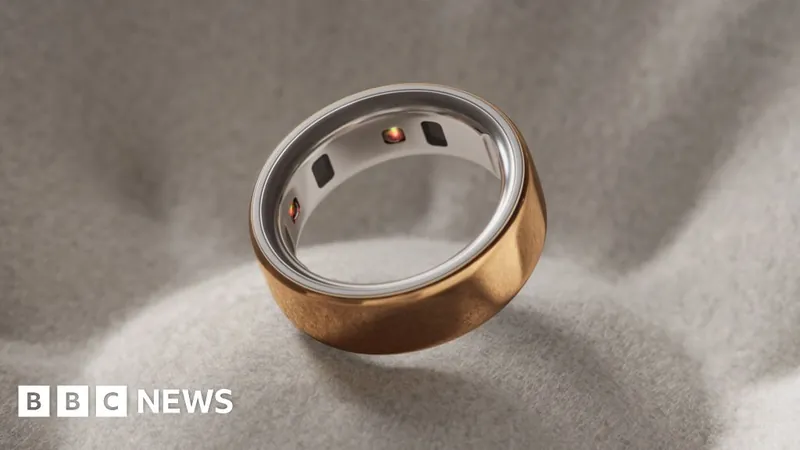
Why Are Doctors Skeptical of Wearable Tech in Health Monitoring? Here's What You Need to Know!
2024-12-02
Author: Ken Lee
Introduction
In recent years, wearable technology, particularly smartwatches, has exploded into a multi-billion dollar industry with a strong emphasis on health tracking capabilities. These devices promise to monitor various health metrics, including exercise routines, heart rates, sleep patterns, and even menstrual cycles. However, the widespread adoption of this technology isn't without its challenges—many healthcare professionals are expressing concerns about its reliability and usefulness.
Wearables in Patient Care
Major health initiatives are looking into integrating wearables into patient care. For instance, UK Health Secretary Wes Streeting has proposed a plan to supply wearables to millions of NHS patients. This would allow them to track health symptoms remotely, especially for managing reactions to cancer treatments.
Doctors' Hesitation
But let's address the elephant in the room: why are some doctors hesitant? While patient experiences often highlight the potential of wearables, there are pressing issues healthcare professionals face regarding this new technology.
Dr. Jake Deutsch, a clinician based in the US, has noticed both pros and cons related to wearable data. While he believes this data can help assess overall health with greater precision, caution is warranted. Other professionals, like Dr. Helen Salisbury, a general practitioner in Oxford, argue that the utility of wearables is often overstated. Though more patients are bringing their health data into consultations, she fears that this trend could lead to hypochondria and unnecessary panic about minor anomalies.
Data Reliability Concerns
Dr. Salisbury points out that many factors can skew the data captured by these devices, like temporary body blips or even device malfunctions. She warns that encouraging constant monitoring might lead to patients rushing to their doctors over issues that may not require immediate attention. Furthermore, she shares concerns about psychological implications—wearables may inadvertently foster a false sense of security against serious health issues, which they aren't designed to detect.
Wearables can encourage healthy habits, echoing traditional medical advice: exercise regularly, limit alcohol intake, and maintain a healthy weight. However, anecdotal evidence surrounding the benefits of monitoring isn’t always balanced with documented cases of false alarms. Though the Apple Watch has been heralded as a life-saver, the amount of false positives goes unreported and could end up complicating patient care.
Clinician Perspectives on Data
When patients present their wearable data to healthcare providers, many clinicians prefer to conduct their assessments. Dr. Yang Wei from Nottingham Trent University stresses the importance of reliability; for example, continuous ECG monitoring is feasible in a hospital setting but impractical in everyday life due to battery limitations on smartwatches.
Moreover, the accuracy of readings can be affected by how and where data is collected. For instance, heart rate data from the wrist is deemed more reliable than that from a finger. Dr. Wei highlights the lack of international standards for wearable devices, which only adds to the complexity of reliance on such technology for critical health metrics.
Real-World Limitations
Real-world incidents shed further light on the limitations of this technology. For example, Ben Wood experienced alarming notifications from his Apple Watch, which mistakenly indicated he had been in a car accident—when, in fact, he was enjoying a day at a racetrack. This situation illustrates the need for caution and clarity in how alerts are managed, raising questions about the future integration of wearables with emergency services and health providers.
Conclusion
In conclusion, while wearable technology holds immense promise for health monitoring, skepticism from the medical community stems from valid concerns about accuracy, over-reliance, and the potential for misinterpretation of data. As technology advances, it remains crucial for both device makers and healthcare professionals to work together to ensure that wearables offer genuine benefits without compromising patient health and peace of mind.



 Brasil (PT)
Brasil (PT)
 Canada (EN)
Canada (EN)
 Chile (ES)
Chile (ES)
 España (ES)
España (ES)
 France (FR)
France (FR)
 Hong Kong (EN)
Hong Kong (EN)
 Italia (IT)
Italia (IT)
 日本 (JA)
日本 (JA)
 Magyarország (HU)
Magyarország (HU)
 Norge (NO)
Norge (NO)
 Polska (PL)
Polska (PL)
 Schweiz (DE)
Schweiz (DE)
 Singapore (EN)
Singapore (EN)
 Sverige (SV)
Sverige (SV)
 Suomi (FI)
Suomi (FI)
 Türkiye (TR)
Türkiye (TR)